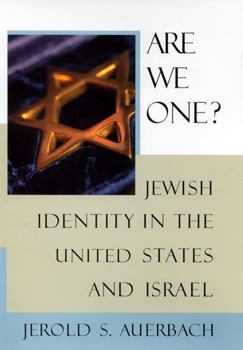Are We One?: Jewish Identity in the United States and Israel
What binds together Jews of Israel and the United States? Amid the hope and frustration generated by the Middle East peace process, the meaning of Jewish statehood is more vigorously contested than ever before. A secular democratic Israel, responsive to Western liberal values, is prepared to make peace with the Palestinians by sacrificing its own historic homeland. But a covenantal Israel, which draws its Jewish identity from divine promise and the biblical narrative, refuses to surrender to modern imperatives. As the very nature of Jewish statehood has become ever more polarized, American Jewish life has been profoundly affected by this fateful Zionist contradiction. In Are We One ? Jerold S. Auerbach presents a surprising new interpretation of this contemporary Jewish dilemma. The modern Jewish impulse to embrace Western values, he writes, exacts a terrible price. He offers a critical reassessment of Zionism, a challenging analysis of the sources of the identification of American Jews with Israel--and a gloomy prognosis of the future of Jewish life, both in Israel and the United States. In a ringing indictment that is sure to spark controversy, he states that the eagerness of secular Israelis to import American culture reflects their sweeping rejection of Jewish and Zionist values. Indeed, the diminishing number of Israelis who actually remain faithful to Jewish religious and historical imperatives are denigrated as fundamentalist zealots by Israeli and American Jews alike. Present-day Israel now exhibits such Jewish self-loathing, he states, that it has depleted its own ability to inspire world Jewry. In a groundbreaking book that draws upon original historical analysis and extensive personal experience in Israel, Auerbach invites readers to consider the debilitating consequences of an adulterated Jewish identity in Israel and in the United States for the very future of Judaism.
Format:Hardcover
Language:English
ISBN:0813529174
ISBN13:9780813529172
Release Date:June 2001
Publisher:Rutgers University Press
Length:264 Pages
Weight:1.06 lbs.
Dimensions:1.1" x 5.8" x 8.8"
Customer Reviews
1 rating
Last best hope for the Jewish state
Published by Thriftbooks.com User , 23 years ago
"That a Jew feels pain upon recognizing Israel's weakness and decay," Yoram Hazony says, "is a sign of a still-living national consciousness, the essential achievement of Zionism." By this standard, Jerold S. Auerbach's "Are We One?" is an irreplaceable contribution to the literature of Zionism. One-part history and one-part polemic by a distinguished academic historian, Auerbach's book explores the problem of identity in a post-Zionist age. Israelis have become little different from American Jews in their eagerness to "normalize," to throw off their Jewishness and assimilate to a secular Western ideal. "With astonishing speed and indifference," Auerbach writes sadly, "Israel has traded its Jewish birthright for a mess of post-Zionist pottage." "Are We One?" is dedicated to reversing the trend. Auerbach shows that, although they come in for abuse from both Jews and non-Jews who are hostile to it, American Zionists may be the last best hope for the Jewish state. For they are the ones who feel the most pain at Israel's weakness and decay. Auerbach is among the best of them. Like Ruth Wisse, Edward Alexander, and Hillel Halkin--the writers in whose ranks he takes a place with this book--Auerbach is in love with Jewish difference, which alone provides justification for the Jewish state. "Are We One?" spells out the character and significance of that difference. And in doing so it advances, in plain and unflinching and memorable language, a stirring defense of Israel's continued Jewish existence. A must-read for those who are sick of post-Zionist appeasement and defeatism.





